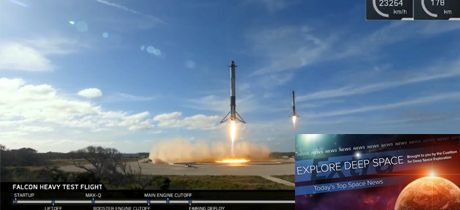In Today’s Deep Space Extra… In spite of a successful first flight with a deep space payload, SpaceX’s powerful Falcon Heavy is not expected to become a human launch vehicle. NASA engineers address the challenge of safely landing on the Martian surface. Two asteroids draw near Earth this week.
Human Space Exploration
SpaceX no longer planning crewed missions on Falcon Heavy
Space News (2/5): Though the prospect was once raised, SpaceX CEO Elon Musk says the Falcon Heavy rocket will not be used to launch astronauts or space tourists. Instead, Musk will focus efforts on developing and testing an even heavier lift rocket, the Big Falcon Rocket.
The supersonic parachutes carrying NASA’s Martian dreams
Wired.com (2/6): Reaching the Martian surface with tons of hardware to support future exploration will require braking from parachutes designed with enough rigor to open in a thin atmosphere at supersonic velocities. Finding an engineering solution has not been easy.
Kennedy Space Center: Walk (virtually) on Mars
USA Today (2/6): At NASA’s Kennedy Space Center, visitors can get a taste of Mars exploration at the Astronaut Training Experience, a virtual venue that includes landing, driving and walking on the red planet. The cost and length of experiences vary. Reservations are available along with day-of booking, based upon availability.
The Greatest Leap, part 5: Saving the crew of Apollo 13
Ars Technica (2/6): The publication takes a look back at one of the tensest episodes in the early history of human deep space exploration and how NASA leadership and ground based experts averted tragedy as the three person crew of Apollo 13 confronted an onboard explosion. Their actions permitted the nation to recover and carry out four more lunar missions.
Space Science
Two small asteroids safely pass Earth this week
NASA/Jet Propulsion Laboratory (2/6): Two asteroids discovered just three days ago by astronomers using the Catalina Sky Survey near Tucson, Arizona, have or will pass close to the Earth this week. On Friday afternoon the 50 to 130 foot long asteroid 2018 CB will pass within 39,000 miles. The slightly smaller asteroid 2018 CC passed within 114,000 miles on Tuesday afternoon.
The way dwarf galaxies move puts a new spin on galaxy formation
Science News (2/5): Observations of curious motions of small star systems around large galaxies have some Swiss scientists puzzled over the role that dark matter plays in galaxy formation. Centaurus A, some 12 million light years from the Earth, sparked the discussion.
Other News
SpaceX launches new megarocket with Tesla car on board
U.S. News (2/6): SpaceX’s new rocket roared away from NASA’s Kennedy Space Center Tuesday for a successful test flight. Founder Elon Musk’s Tesla roadster was a primary payload and was lofted on a trajectory that will cross the orbit of Mars.
Why doesn’t Canada have a rocket program?
CBC News of Canada (2/6): Canada’s absence of a rocket development program has some in its aerospace engineering community concerned and seeking work in other countries. Among them, Andrew Rader, of SpaceX, the mission manager for Tuesday’s Falcon Heavy launch.

